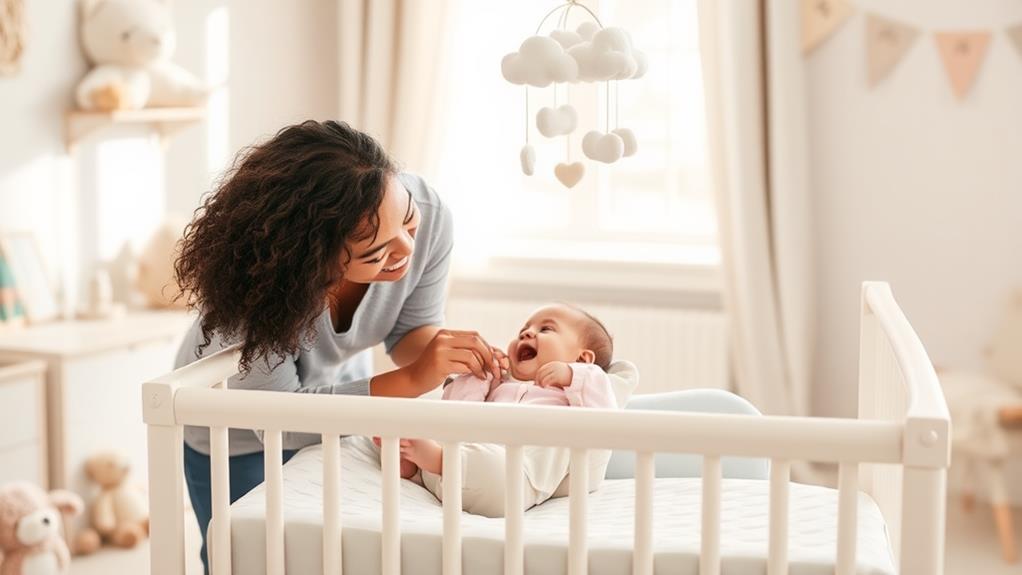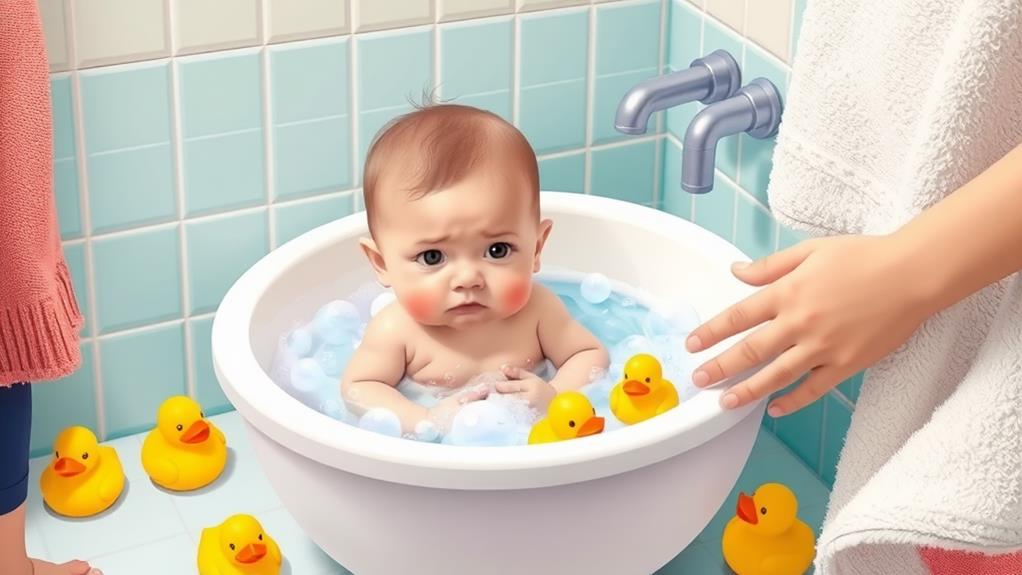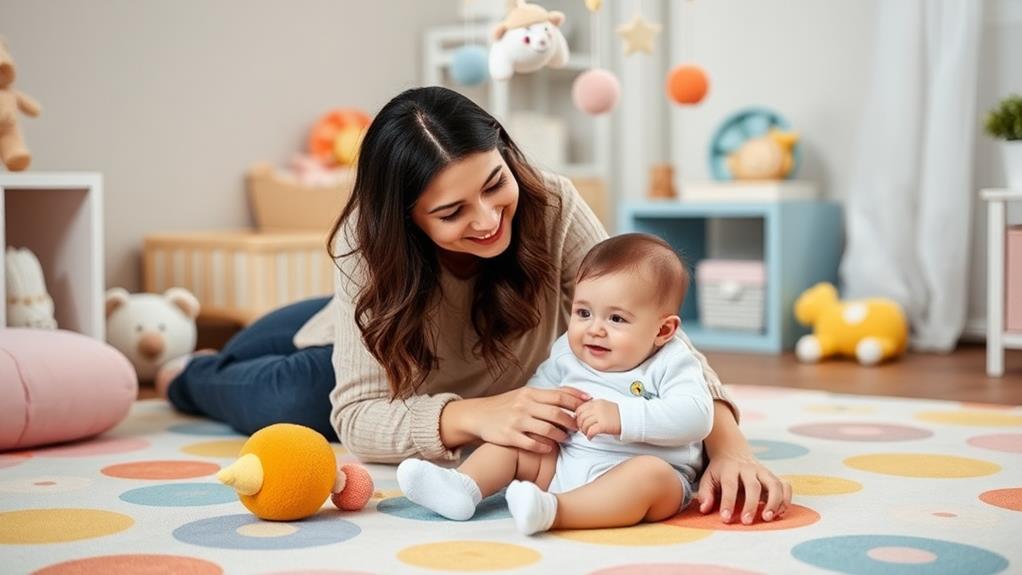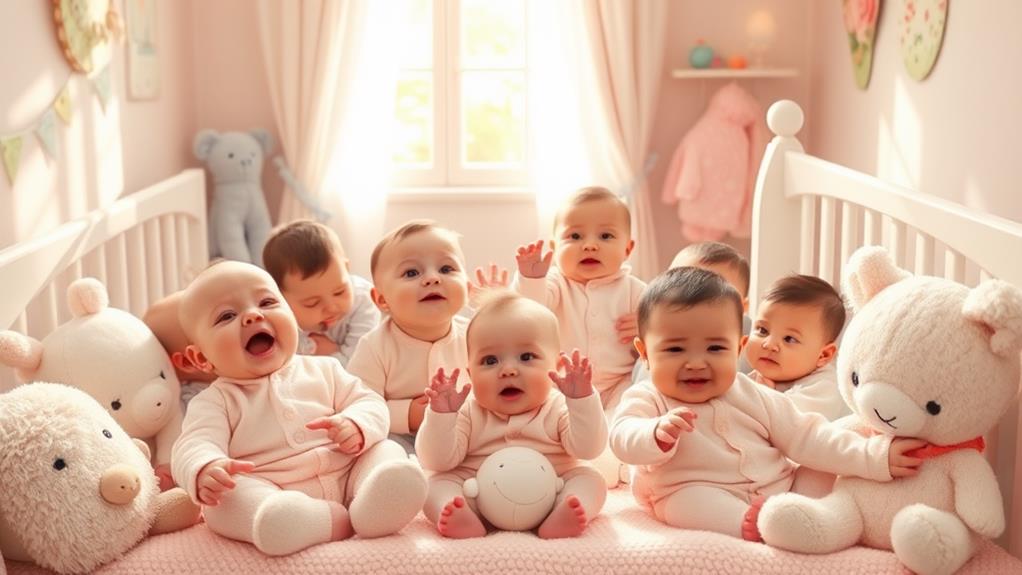You might be curious about when your baby will start to coo and how you can encourage this delightful milestone. Typically, cooing begins around 6 to 8 weeks, signaling your baby's growing happiness and comfort. Engaging in simple activities, like making eye contact or mirroring those sweet sounds, can foster this early communication. But what specific strategies can truly enhance your baby's vocal exploration? Understanding the nuances of this developmental stage could unlock a deeper connection between you and your little one.
What Is Cooing?

Cooing marks the beginning of your baby's vocal journey, typically starting around 6 to 8 weeks of age. You'll notice those adorable soft vowel-like sounds, like "ooh" and "aah."
Cooing is a big deal in language development. It shows your baby is starting to play with sounds and figure out how to use their muscles for speech. Unlike crying, which often means they need something, cooing happens when they're happy and content.
These sweet sounds are essential for emotional bonding between you and your little one. When you respond to their coos, it creates a special connection that deepens your relationship. Plus, it helps babies learn early communication skills, making them feel understood and loved.
As your baby grows, they'll go from cooing to more complex sounds, like babbling with consonants, usually around 4 to 6 months.
Timeline of Cooing
Around 6 to 8 weeks, you'll start hearing those delightful cooing sounds from your baby, marking the beginning of their vocal exploration. This is when babies start to make soft, vowel-like sounds like "oo" and "aa." It's such a sweet moment, and you might find yourself smiling every time they make those cute baby sounds!
As your little one grows, usually by 3 to 4 months, their cooing becomes more varied and expressive. They're finding their voice, and you'll notice a range of sounds coming from them. This is a crucial time for language development, as cooing lays the foundation for later speech.
Around 4 to 6 months, babies transition from cooing to babbling. They'll mix consonant and vowel sounds, which is super exciting! This change signals that they're ready to explore more complex forms of communication.
To encourage baby cooing, talk and sing to your little one often. Responding to their sounds helps them feel heard and loved, promoting their confidence in making more sounds.
Importance of Cooing
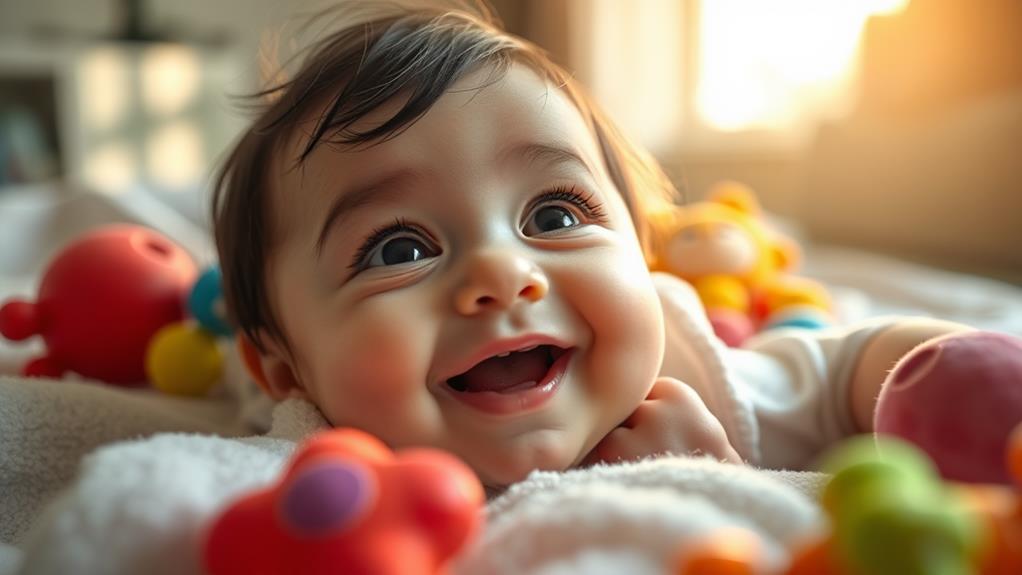
The sounds your baby makes during cooing play a vital role in their development. When your little one starts cooing around 6 to 8 weeks, it's more than just cute noises; it marks a significant milestone in their language skills and emotional bonding.
These sweet vocalizations not only show that your baby is content but also help them connect with you and others. Engaging in cooing encourages turn-taking in communication, like a mini-conversation between you and your baby.
This back-and-forth interaction fosters essential early conversational skills and helps your baby learn to discriminate sounds. Plus, cooing lays the groundwork for babbling, which comes around 4 to 6 months, setting the stage for future speech development.
Factors Influencing Cooing
A baby's cooing can be influenced by several factors that vary from child to child. For starters, some babies begin cooing as early as 6 weeks, while others mightn't start until they're 2 months old.
One big factor is environmental stimulation. When your baby hears voices, music, and various sounds, they're more likely to engage in cooing. So, don't be shy—talk, sing, and let those tunes play!
Another important factor is caregiver interaction. When you respond to your baby's sounds and engage with them, it encourages their vocal exploration and increases how often they coo. Think of it as a fun back-and-forth conversation, even if it's just your baby gurgling away.
Also, the exposure to language in their environment really matters. The more verbal interactions your baby has, the sooner they might start cooing. It's like giving them an early ticket to the vocalization party!
But keep an eye on auditory responses too. Health conditions like hearing impairments can affect cooing, so monitoring their hearing is crucial. All these factors together create a delightful recipe for your baby's cooing journey!
How to Encourage Cooing

Encouraging your baby to coo can be a joyful experience, and there are plenty of simple strategies to help foster this delightful stage of communication. One of the best ways to support your baby's cooing is to make eye contact during face-to-face interactions. This connection not only encourages them to coo but also strengthens your bond.
Try imitating their coos and sounds; babies love it when you mimic them, and it promotes early communication. You can also narrate daily activities and describe objects around you. This introduces new sounds and vocabulary that help your baby develop their language skills.
Moreover, fill their environment with a variety of sounds and music. This rich auditory landscape can inspire vocal exploration and encourage cooing.
Don't forget to read books aloud! It's not just about the stories; it helps your baby grasp sentence structure and enhances their vocabulary.
Milestones Following Cooing
After the delightful stage of cooing, you'll notice your baby entering another exciting phase of language development: babbling. Around 4 to 6 months, babies make sounds like "ba," "da," and "ga." This is where their vocal cords start to really get a workout!
Babbling isn't just random noise; it's a crucial milestone that helps establish turn-taking in conversations.
By the time your little one reaches about 12 months, they might surprise you by saying their first recognizable words. This is a significant moment in their language journey!
As your baby continues to explore sounds, ongoing vocal play and interaction are key. Engaging with them through reading and talking can really boost their language skills.
It's like planting seeds for a beautiful garden of words! The more you converse, the clearer their speech will become, and their vocabulary will expand.
Baby Growth Chart Calculator
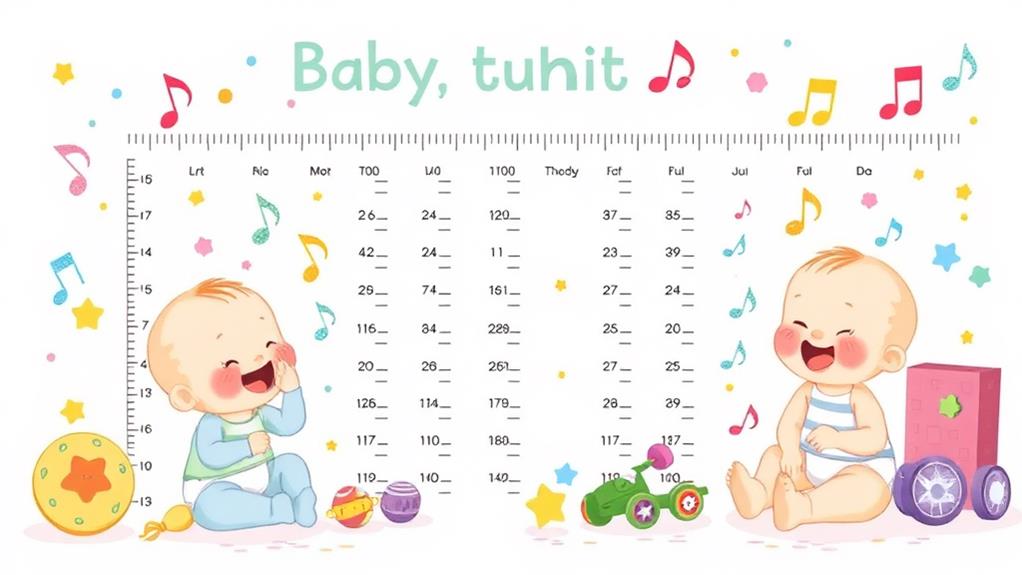
Tracking your baby's growth is just as important as celebrating their cooing and babbling milestones. A baby growth chart calculator is a handy tool that lets you keep an eye on your little one's height, weight, and head circumference. By entering details like age and measurements, you can monitor growth patterns and see how your baby's development stacks up against World Health Organization standards.
Using this calculator regularly helps you spot trends over time, ensuring your baby is hitting those developmental milestones. Plus, these calculators give you percentile rankings, making it easier to understand where your baby stands compared to other kiddos their age. It's like having a little competition, but in a friendly way!
Pediatricians often recommend using growth charts during routine check-ups, so don't forget to bring your calculations along. After all, you want to track not just those adorable baby sounds, but also how your baby is growing and thriving.
When to Seek Help
It's important to pay attention to your baby's cooing and social engagement, as these early milestones can provide valuable insights into their development.
If your little one hasn't started cooing by 4 months, it might be a good idea to consult your pediatrician. They can help assess your baby's developmental progress and ensure everything's on track.
Additionally, if your baby isn't responding to loud sounds or voices, that could indicate potential hearing issues. You'll want to get that checked out as soon as possible.
Also, keep an eye on how your baby interacts socially. If they're not smiling at people or showing engagement by 4 months, a developmental assessment might be necessary.
Don't forget about communication skills! If your baby isn't imitating sounds or facial expressions by that age, it's another reason to seek professional advice.
Regular pediatric check-ups are crucial for monitoring these developmental milestones. They're like a safety net, catching any concerns related to cooing and communication before they become bigger issues.
Essential Newborn Toys
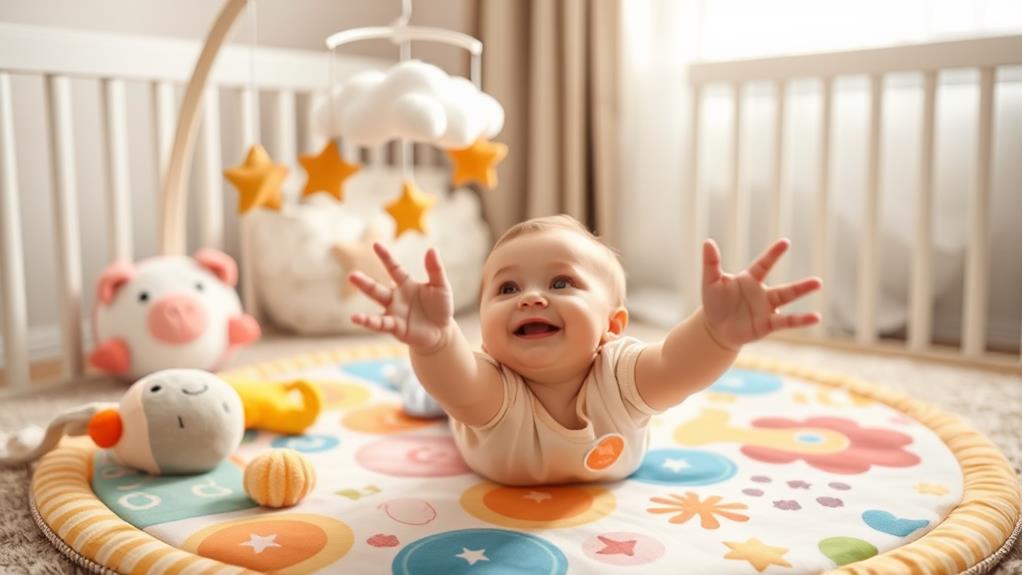
Choosing the right toys for your newborn can significantly enhance their sensory development and overall engagement. For babies aged 0-12 weeks, focus on toys that provide visual and auditory stimulation. Soft toys that make sounds are great for capturing your baby's attention, encouraging cooing and making those adorable gurgling noises.
Developmental play gyms are essential too! They promote tummy time and motor skills while engaging your baby's curiosity with colorful designs and dangling toys. Plus, they'll love reaching out to grab things, which helps with their grasping skills. Rattles and handheld toys are perfect for this age, allowing your little one to practice grasping while exploring different textures.
As your baby grows to 3-4 months, interactive toys that respond to their movements or sounds can be a hit! These toys can stimulate vocalization and social interaction, making playtime even more fun.

